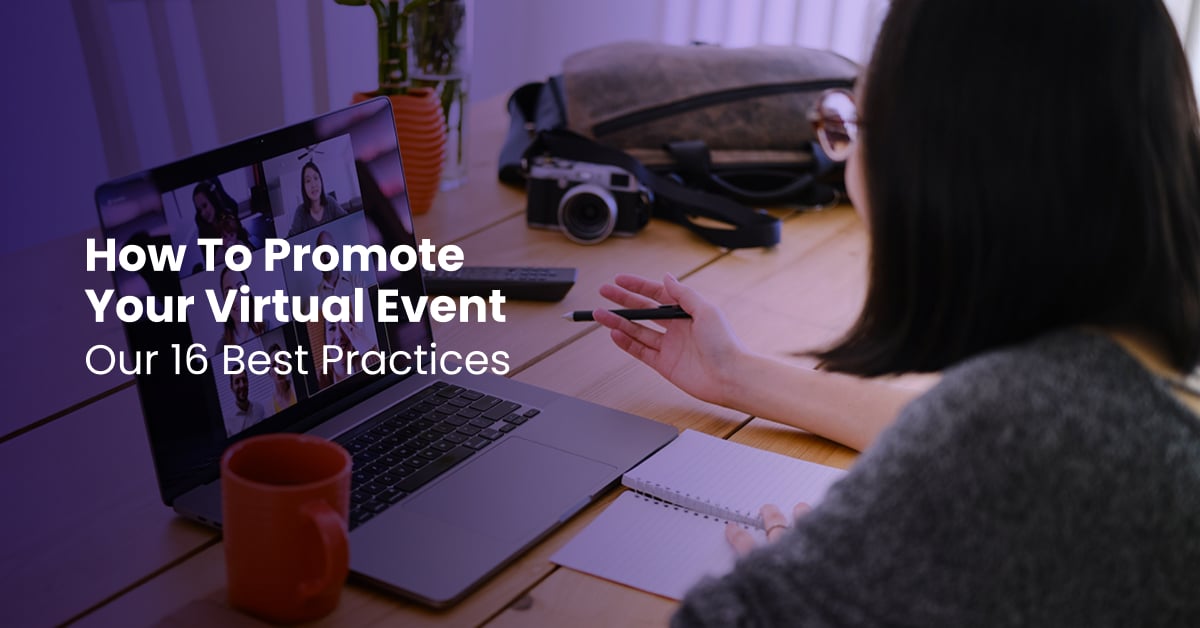What Are The Best Virtual Event Marketing Strategies?
Virtual events require well-thought-out marketing strategies to engage the audience and meet event goals. Implementing these strategies effectively can boost brand awareness and attendee engagement.
How Can You Implement These Strategies Effectively?
Understand Your Audience: Dive into audience insights to tailor your content and promotional strategies. This makes it easier to capture their interest.
Social Media Marketing: Utilize platforms like Facebook and Instagram to create buzz before your event. With 4.9 billion people using social media globally, you can reach a wider audience.
Create Dedicated Landing Pages: A well-designed landing page provides all necessary details and collects RSVPs, enhancing visitor experience.
Engage With Content: Use webinars, Q&A sessions, and other interactive forms to engage your audience throughout the event.
Leverage Partnerships: Collaborate with influencers and industry leaders to promote your event. This boosts credibility and reach.
Follow Up Post-Event: Send personalized thank-you emails or surveys to keep the conversation going and gather feedback.
What Are The Benefits Of Using Virtual Event Marketing?
Increased Reach: Unlike physical events, virtual events allow you to cater to a global audience without geographical barriers.
Cost Efficiency: Virtual events cut down on costs like venue bookings and travel, making them more economical.
Enhanced Engagement: Interactive features like live polls and chat rooms offer better engagement compared to traditional methods.
Flexibility: Virtual events can be archived, allowing attendees to revisit sessions later.
Data and Analytics: Online platforms offer detailed analytics, helping to measure the success of your virtual event marketing strategy.
Networking Opportunities: Virtual events provide unique networking tools that allow attendees to connect with each other, providing value beyond the event itself.
How Can Virtual Events Improve Store Metrics?
Virtual events can drive significant improvements in store metrics by enhancing customer engagement, increasing brand awareness, and fostering a community around your products. They offer valuable opportunities to gather data and track key performance indicators (KPIs).
What Metrics Should You Focus On?
Focus on metrics that directly impact your sales and customer engagement. Conversions are a primary metric; they measure how many event participants turn into paying customers. Tracking the ROI is crucial to understand the value generated compared to the cost of the event. Engagement metrics like the number of interactions, clicks, and shares also indicate how well your event resonates with the audience.
It’s also important to measure the customer acquisition cost (CAC) and the customer lifetime value (CLV). Lowering the CAC while increasing CLV shows that your event strategy is effective. Using these metrics helps in optimizing future virtual events for better outcomes.
How Do You Measure The Success Of Virtual Events?
Tracking the success of virtual events involves several tools and methods. Platforms often have built-in analytics dashboards that provide real-time data. These dashboards track user behavior, from the number of attendees to their engagement levels. Surveys and feedback forms can offer qualitative insights into customer satisfaction and areas for improvement.
To measure tangible benefits, assess the number of leads generated and their conversion rate. Using metrics from tools like the Goldcast ROI Dashboard can aid in understanding the financial impact. Comparing these metrics against previous events or other marketing campaigns provides a clearer picture of your success.
Effective tracking and measurement are essential for optimizing virtual events and improving store metrics. For detailed strategies and tips on event marketing, consider resources like the virtual event marketing guide. Additionally, explore tactics on increasing engagement by understanding your audience better on platforms like EventsAir.
What Are The Key Components Of A Successful Virtual Event?
Key components of a successful virtual event include careful planning, the right technology, engaging content, and interactive elements. It’s also crucial to choose the right tools and platforms to ensure smooth operation.
How Do You Plan A Virtual Event?
Planning a virtual event involves several steps. Start by defining clear objectives and goals. Identify the target audience and what they hope to gain from attending.
Next, choose a date and time that works best for your audience. Take time zones into account, especially if you have an international crowd.
Develop a detailed event agenda. Include sessions like keynotes, panel discussions, and Q&A sessions. Make sure each segment has a clear purpose.
Select your speakers and gather guest speaker information. Aim to have a mix of industry experts and engaging personalities.
Promote the event across various channels. Use social media, email campaigns, and partnerships with sponsors to build anticipation.
What Tools Are Essential For Virtual Event Success?
The right tools are key for the success of any virtual event. Start with a reliable event platform that supports features like live streaming, live chat, and live polls.
Invest in quality camera and microphone equipment for your speakers. This ensures clear audio and video.
Interactive tools like live chat and live polls enhance participant engagement. Schedule interactive sessions where attendees can ask questions in real-time.
Provide exclusive content to keep attendees engaged. This can include downloadable resources or VIP Q&A sessions with speakers.
Sponsors and partners should have dedicated space within the event platform. This ensures they gain visibility and helps cover event costs.
Don’t forget analytics tools to measure the success of your event. Track metrics like attendee numbers, engagement rates, and feedback to continually improve.
How Can You Promote Your Virtual Event Effectively?
Promoting a virtual event requires effective use of marketing channels and pre-event engagement strategies to maximize attendance and interest. Utilizing various platforms and creating compelling content are crucial steps.
What Marketing Channels Should You Use?
Using email marketing is essential. Sending a targeted email marketing campaign can inform and excite your audience. Personalize emails to make them relevant, and include a clear call-to-action for registration.
Social media marketing is another powerful tool. Create engaging posts on platforms like Facebook, Twitter, and LinkedIn. Utilize Facebook Events to track RSVPs and create buzz with live social media posts. Don’t forget SEO optimization for your event website to attract organic traffic.
A dedicated landing page for the event is vital. Ensure the registration process is seamless, and the page includes all necessary details. Incorporate engaging videos that highlight what attendees can expect. Press releases can also amplify your message by reaching a broader audience.
How Can You Engage Your Audience Before The Event?
Content creation is key to keeping your audience engaged. Share blog posts, videos, and sneak peeks of what to expect at the event. This builds interest and FOMO (fear of missing out).
Use social media platforms to maintain engagement. Start conversations, ask questions, and conduct polls. Cross-promotion with partners or influencers can expand your reach. Encourage your speakers to share the event with their followers.
Send out follow-up emails as reminders. Include valuable information about the event, such as a detailed agenda or special guest appearances. Ensure these emails are personalized to resonate with your audience.
Engage directly with your audience through live chats or Q&A sessions. This interaction can provide audience insights that help tailor the final stages of event preparation.
What Common Challenges Are Faced In Virtual Event Marketing?
Virtual event marketing is filled with unique challenges that can affect the success of an event. Key issues include engaging attendees, dealing with budget constraints, and ensuring effective post-event engagement.
How Can You Overcome These Challenges?
The most significant challenge in virtual event marketing is keeping attendees engaged. To address this, use interactive tools like polls, surveys, and live Q&A sessions. These can turn passive viewers into active participants and increase engagement.
Budget constraints are another common pain point. Optimize spending by using cost-effective marketing methods such as direct mail campaigns and social media promotions. Allocating resources wisely can help in better audience reach and engagement.
After the event, post-event engagement is crucial. Sending out a thank you email and conducting post-event surveys can provide valuable feedback and improve future events.
What Lessons Can Be Learned From Past Events?
Past events offer numerous lessons on what works and what doesn’t. Collecting attendee testimonials can provide genuine insights into their experiences. Use this feedback to identify what needs improvement.
Timing is critical. Ensure that the event schedule is accommodating to your target audience’s time zones. Incorrect timing can lead to lower attendance and engagement, especially for a global audience.
It’s also essential to fine-tune content strategies. Analyze which topics garnered the most interest and which speakers resonated with the audience. This way, future events can be tailored to meet the audience’s expectations better.
Consistency in post-event engagement fosters loyalty. Customer testimonials and post-event surveys can shed light on areas for improvement, further enhancing the overall event experience.
What Are The Future Trends In Virtual Event Marketing?
As virtual events continue to grow, it’s important to understand the trends shaping their future. New engagement strategies and innovative technologies are setting the industry apart.
How Can You Stay Ahead Of The Curve?
To stay ahead, focusing on engagement is crucial. Event producers are now prioritizing interactive elements like live polls, Q&A sessions, and breakout rooms to keep attendees engaged. These strategies help maintain interest and provide a richer experience.
Another way to get ahead is by using data analytics. By analyzing attendee behavior, preferences, and feedback, companies can tailor content and make improvements. Personalized content not only boosts engagement but also makes attendees feel valued.
Finally, partnerships with tech companies can offer a competitive edge. Collaborating with platforms that provide comprehensive support services can streamline the event planning process. It’s crucial to be versatile and open to incorporating new features and tools.
What Innovations Are Shaping The Industry?
The use of AI and VR technology is revolutionizing virtual events. AI can manage tasks like automatic scheduling, personalized agendas, and real-time translation services. These utilities enhance user experience and reduce the workload for organizers.
Virtual Reality (VR) creates immersive environments where participants can explore virtual booths, attend holographic presentations, and network in 3D spaces. This kind of innovation can make virtual events more interactive and engaging.
Comprehensive engagement strategies are key. According to Kaltura, planning detailed engagement tactics can significantly improve the attendee experience. Companies are also investing in more secure platforms, ensuring that private information stays protected.
Additionally, the market for virtual events is expected to reach $404 billion by 2027, as per Statista. This growth signifies not just increased adoption but also stiffer competition, urging companies to continuously innovate.
By keeping an eye on these innovations, businesses can maintain a competitive edge in the evolving landscape of virtual events.
Frequently Asked Questions
When marketing virtual events, it is important to follow some key best practices, focus on effective promotional tactics, and leverage the right digital marketing strategies. Below are answers to some common questions related to virtual event marketing.
What are the key best practices for marketing virtual events effectively?
Identify your target audience clearly to tailor your messaging. Use engaging content like webinars and social media posts to attract attendees. It’s also important to utilize email marketing for personalized invites and reminders.
How can you effectively promote virtual event registrations?
Leverage social media channels to reach a broader audience. Create a compelling event page with clear call-to-actions. Collaborate with influencers and use paid advertising to boost visibility. For more strategies, you can visit 11 Strategies to boost conversion.
What are some successful examples of virtual event marketing?
Webinars that offer exclusive insights or training sessions often see high engagement. Virtual job fairs and online product demos are also popular. These events typically use interactive elements and Q&A sessions to keep attendees engaged.
What digital marketing strategies are most effective for online events?
SEO and content marketing help drive organic traffic. Social media campaigns, email newsletters, and paid ads are also crucial. Tools like Eventbrite simplify event management and integrate well with digital marketing efforts. Explore more at Virtual Event Marketing Guide.
How far in advance should marketing efforts begin for a successful virtual event?
Begin your promotional efforts at least 6-8 weeks before the event. This allows enough time for multiple touchpoints with your audience through various channels, including email, social media, and paid advertising.
What role does event technology, like Eventbrite, play in virtual event marketing?
Event technology platforms like Eventbrite streamline the registration process, offer promotional tools, and provide analytics. They integrate with calendars and CRM systems, enhancing the overall event experience.
By implementing these strategies and leveraging the right technologies, you can significantly improve the success of your virtual events.



